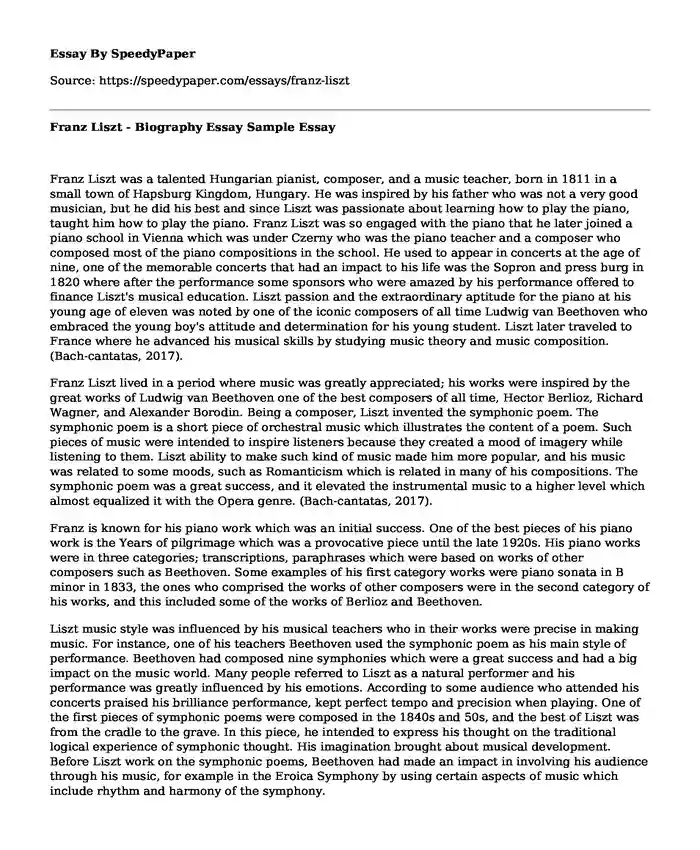Franz Liszt was a talented Hungarian pianist, composer, and a music teacher, born in 1811 in a small town of Hapsburg Kingdom, Hungary. He was inspired by his father who was not a very good musician, but he did his best and since Liszt was passionate about learning how to play the piano, taught him how to play the piano. Franz Liszt was so engaged with the piano that he later joined a piano school in Vienna which was under Czerny who was the piano teacher and a composer who composed most of the piano compositions in the school. He used to appear in concerts at the age of nine, one of the memorable concerts that had an impact to his life was the Sopron and press burg in 1820 where after the performance some sponsors who were amazed by his performance offered to finance Liszt's musical education. Liszt passion and the extraordinary aptitude for the piano at his young age of eleven was noted by one of the iconic composers of all time Ludwig van Beethoven who embraced the young boy's attitude and determination for his young student. Liszt later traveled to France where he advanced his musical skills by studying music theory and music composition. (Bach-cantatas, 2017).
Franz Liszt lived in a period where music was greatly appreciated; his works were inspired by the great works of Ludwig van Beethoven one of the best composers of all time, Hector Berlioz, Richard Wagner, and Alexander Borodin. Being a composer, Liszt invented the symphonic poem. The symphonic poem is a short piece of orchestral music which illustrates the content of a poem. Such pieces of music were intended to inspire listeners because they created a mood of imagery while listening to them. Liszt ability to make such kind of music made him more popular, and his music was related to some moods, such as Romanticism which is related in many of his compositions. The symphonic poem was a great success, and it elevated the instrumental music to a higher level which almost equalized it with the Opera genre. (Bach-cantatas, 2017).
Franz is known for his piano work which was an initial success. One of the best pieces of his piano work is the Years of pilgrimage which was a provocative piece until the late 1920s. His piano works were in three categories; transcriptions, paraphrases which were based on works of other composers such as Beethoven. Some examples of his first category works were piano sonata in B minor in 1833, the ones who comprised the works of other composers were in the second category of his works, and this included some of the works of Berlioz and Beethoven.
Liszt music style was influenced by his musical teachers who in their works were precise in making music. For instance, one of his teachers Beethoven used the symphonic poem as his main style of performance. Beethoven had composed nine symphonies which were a great success and had a big impact on the music world. Many people referred to Liszt as a natural performer and his performance was greatly influenced by his emotions. According to some audience who attended his concerts praised his brilliance performance, kept perfect tempo and precision when playing. One of the first pieces of symphonic poems were composed in the 1840s and 50s, and the best of Liszt was from the cradle to the grave. In this piece, he intended to express his thought on the traditional logical experience of symphonic thought. His imagination brought about musical development. Before Liszt work on the symphonic poems, Beethoven had made an impact in involving his audience through his music, for example in the Eroica Symphony by using certain aspects of music which include rhythm and harmony of the symphony.
Liszt playlist became more personal when he lost his father, and this was evident in most of his symphonic poems. Liszt dramatic performance which caught the attention of a lot of audiences was in the winter of 1831/1832 where he performed at the end of year concert. When he was playing on the stage, he used specific aspects that made his performance brilliant. In a statement by one of his audiences, she describes how she experienced a liberating feeling while listening to Liszt at a live concert.
Franz Liszt playing included some themes which were incorporated in his compositions. His expressions in music were mainly based on his psychological study of emotions that enabled him to make outstanding performances which left the crowd yearning for more. However, Liszt sometimes went through a lot of mockeries due to some facial expressions he made and the gestures he did while playing the piano but this did not stop his great music from becoming popular across Europe.
Program my music was also another style that the famous composer used. This is a type of music that evokes a certain emotion, and it creates an impression of the message in the poem to the listener. This kind of music was before played by Hector Berlioz also one of the best composers of that time, Liszt also argued that program music should be added in music while it is necessary when a piece of music requires more explanation.
References
Bach-cantatas. (2017, May 16). Franz Liszt (Composer, Arranger) - Short Biography. Retrieved from http://www.bach-cantatas.com/Lib/Liszt-Franz.htm
Cite this page
Franz Liszt - Biography Essay Sample. (2022, Jun 03). Retrieved from https://speedypaper.com/essays/franz-liszt
Request Removal
If you are the original author of this essay and no longer wish to have it published on the SpeedyPaper website, please click below to request its removal:
- Essay Example on Presentation Skills on YouTube
- Effects of Single Parenting in Our Free Essay Example
- Free Essay Sample: Uniforms Should Be Allowed in Public Schools
- Free Essay with Folklore Juxtaposition
- New Stroke Protocol - Free Essay Example
- Creativity Innovation and Design Essay Sample
- Essay Sample with Rhetorical Analysis: The Declaration of Independence
Popular categories





